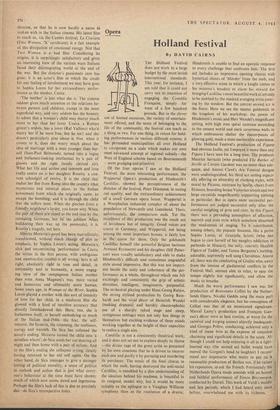Opera
Holland Festival By DAVID CAIRNS Of the four operas I saw at the Holland Festival, the most interesting performance, the Wuppertal Opera's production of Hindemith's Cardillac, showed the perceptiveness of the director of the festival, Peter Diamand, in nosing out quality, and the extraordinary achievement of a small German opera house. Wuppertal is a Westphalian industrial complex of about the population of Newcastle and Gateshead. There, .unfortunately, the comparison ends. Yet the excellence of this production was the result not of lavishness but of integrity. Good voices are scarce in Germany, and Wuppertal, not being among the most important houses, is fairly low in the queue for them. Only the goldsmith Cardillac himself (the powerful Belgian baritone Armand Reynaerts) and his daughter (Siff Petter- son) were vocally satisfactory and able to make Hindemith's difficult and sometimes ungrateful style sound impressive. But this was not import- ant beside the unity and coherence of the per- formance as a whole, throughout which one felt excitingly and consistently the grip of artistic direction, intelligent, imaginative, purposeful. The orchestral playing under Hans Georg Ratjen, the strong stylised production by Georg Rein- hardt and the vivid decor of Heinrich Wendel (making dramatic and harshly claustrophobic use of a sharply raked stage and steep, vertiginous settings) were not only fine things in themselves but exciting evidence of three minds working together at the height of their capacities to realise a single aim.
Cardillac is not a consistently theatrical work, and it does not set out to explore deeply its theme —the divine rage of the great artist so possessed by his own creations that he is driven to recover each one and purify it by pursuing and murdering its purchaser. The music of the final chorus in which the mob, having destroyed the anti-social Cardillac, is ennobled by a dim understanding of the idealism behind his madness, is beautiful in its resigned, modal way, but it would be more suitable as the epilogue to a Vaughan Williams symphony than as the resolution of a drama; Hindemith is unable to find an operatic response to every challenge that confronts him. The first act includes an impressive opening chorus with hysterical shouts of 'Morder' from the mob, and a very effective scene in which a knight comes to his mistress's boudoir to claim his reward for bringing Cardillac s most beautiful work of art only to be stabbed by the masked avenging artist enter- ing by the window. But the central second act is the finest. Here we see the master goldsmith in the kingdom of his workshop; the power of Hindemith's music and Herr Wendel's magnificent setting, with high iron spiral staircase ascending to the unseen world and stark cavernous walls in which embrasures shelter the masterpieces of glowing gold, made a most memorable experience.
The Holland Festival's production of Figaro had obvious faults, yet I enjoyed,it more than any Figaro I have seen for a long time. The producer Maurice Sarrazin (who produced The Barber of Seville at Covent Garden) was no more than ade- quate, and Antoni Chive's Aix Festival designs were undistinguished, his third act setting especi- ally offering an absurdity of clashing styles, with mural by Picasso, staircase by Searle, chairs from Elsinore, boarding-house Victorian screen and two large caryatids magnificently supporting nothing in particular. But in opera most successful per- formances are judged successful only after the careful weighing of pros and cons. In this Figaro there was a pervading atmosphere of affection, warmth and even style which somehow absorbed the weaknesses Of staging. To it. contributed, among others, the piquant Susanna, like a petite Sophia Loren, of Graziella. Sciutti (who has begun to cure herself of her naughty addiction to parlando in Mozart), the salty, coarsely likeable Figaro of Taddei, and Teresa Berganza's melting, adorable, supremely well sung Cherubino. Above all, there was the conducting of Giulini who, away from the tension of gladiatorial conflicts in the Festival Hall, seemed able to relax, to ease the tempo slightly but significantly, and allow the music to breathe.
Much the worst performance I saw was the production of Benvenuto Cellini by the Nether- lands Opera. Nicolai Gedda sang the main part with considerable elegance, but his conception of Cellini was that of an intoxicated signalman. Marcel Lamy's production and Francois Gan- eau's decor were at best routine, at worst (in the carnival and forging scenes) abjectly inadequate, and Georges Pretre, conducting, achieved only a kind of inane brio at the expense of countless charming and significant details in the score. Al- though I could not help enjoying it all in a light- hearted way (the second act ballet would have moved the Gorgon's head to laughter) I recom- mend any impresario who wants to put on a reasonable production of Berlioz not, if he values his reputation, to ask the French. Fortunately the Netherlands Opera made amends with an honest and faithful performance of Simon Boccanegra, conducted by Dorati. This work of Verdi's middle and late periods, which I had heard only once before, overwhelmed me with its richness.


































 Previous page
Previous page